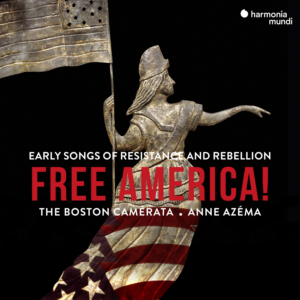Boston Camerata: New Album + Tour of Rebellious Early American Music

The Boston Camerata, cited as "America's foremost early music ensemble" by Le Monde, embarks on a celebration of music from the time of the American Revolution with the release of Free America! Songs of Resistance and Rebellion (1790-1860), a new project recorded by Harmonia Mundi. The album release on September 13, 2019 will be complemented by live concerts of Free America! in Sister Cities Boston, MA and Strasbourg, France, as well as in Portland, ME.
First commissioned by the Paris Philharmonie in a program Early Music America called "profoundly researched and well thought out," Free America! celebrates ideas fostered by the young American Republic in the late 1700s and early 1800s that continue to be debated to this day. Union, Liberty, and Democracy were the unifying ideals of the federation: a desire for a new social harmony, a new system of common beliefs, on a new soil which was often equated to the Promised Land.
"This music is about the soul of the American founding generation. There is strong momentum and connection in looking backward and being able to invent forward," says Boston Camerata Artistic Director Anne Azéma.
Having scattered the European foes, young America's preoccupation turned to establishing a community of people with common interests. Music and poetry actively participated in this process, delivering insights and multiple visions of the future, along with moral and spiritual authority.
Alongside the figures of the 'Founding Fathers' such as George Washington, there were also thinkers and spiritual leaders like Thomas Paine who wrote two of the most influential pamphlets at the beginning of the American Revolution, inspiring the new Americans to declare independence in 1776. Ordinary citizens, the 'Common Man' such as sailors, soldiers, and poor immigrants, all were to have a place in this new Promised Land, each with his or her hope for a democratic society.
The repertoire of Free America! consists of music for voices, for voices with instruments, and for instruments alone. Each of these settings, employing straightforward texts and musical language, speaks directly to the hearts and minds of the performers. Several works, including songs from the manuscript musical archive of the Maine Shaker community, evoke the injustices of slavery. The instrumental music comes from various sources, including manuscript booklets from the hands of early flutists and fiddlers.
Listen to the album on Spotify:
Comments

Videos

